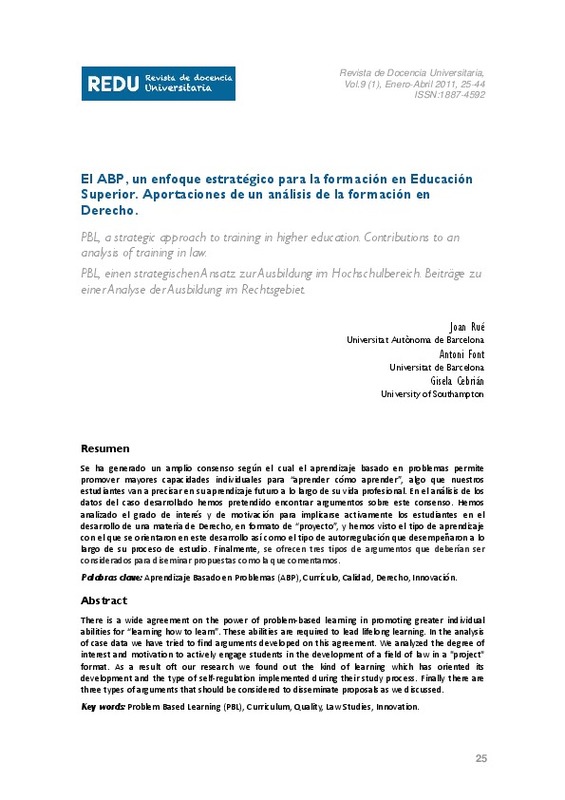Ahearn, A, Et Al, (2008), A twenty‐first century student, IN BENNET, R., DI NAPOLI, R., 2008, Changing identities in Higher Education, Voicing Perspectives, Routledge, pp. 175‐185.
Arendt, Hannah. (1998), The Human Condition. 1958. Chicago: The University of Chicago Press.
Barrows, Howard S.; Tamblyn, R. M. (1980), Problem‐based learning : an approach to medical education, New York : Springer
[+]
Ahearn, A, Et Al, (2008), A twenty‐first century student, IN BENNET, R., DI NAPOLI, R., 2008, Changing identities in Higher Education, Voicing Perspectives, Routledge, pp. 175‐185.
Arendt, Hannah. (1998), The Human Condition. 1958. Chicago: The University of Chicago Press.
Barrows, Howard S.; Tamblyn, R. M. (1980), Problem‐based learning : an approach to medical education, New York : Springer
Barrows, H.S.; Wee Keng Neo, L. (2007), Principles and Practice of aPBL. Singapur: Pearson Prentice Hall.
Biggs, J. (2003), Teaching for quality learning at university. Buckinghamshire, Society for Research into Higher Education and Open University Press.
Biggs, J. B.; Collins, K. (1982), Evaluation the quality of learning: the SOLO taxonomy (structure of the observed learning outcome), New York etc.: Academic Press.
Boud, D. (1985), "Problem‐based Learning in Perspective", en Boud, D. (ed.), Problem‐ based Learning in Education for the Professions, Higher Education Research and Development Society of Australasia: Sydney.
Bloom, B. S. (1956), Taxonomy of Educational Objectives. Book 1: Cognitive Domain, David McKay Inc.: New York.
Branda, L. A. (2009), "L'aprenentatge basat en problemes", en AA.VV. "L'aprenentatge basat en problemes", IDES‐UAB: Cerdanyola del Vallès.
Bridges, E. M. (1992), Problem Based Learning for Administrators, Eugene: ERIC, University of Oregon.
Cruickshank, David A. (1996), "Problem‐based Learning in Legal Education", en Teaching Lawyer Skills, London: Butterworths.
Engel, Charles E. (1997), "Not just a method but a way of learning", EN BOUD, DAVID AND FELETTI, GRAHAME (ed.), The Challenge of Problem‐based Learning, 2ª ed., London‐Stirling: Kogan Page.
Font, A. (2004), "Líneas maestras del aprendizaje por problemas", Revista Interuniversitaria de Formación del Profesorado 18 (1), 16.
Gibbs, G. (1995). Assessing Student Centred Courses. Oxford: Oxford Centre for Staff Learning and Development.
Handal, G.; Lycke, K., (2004), 'From higher education to professional practice: Learning among students and professionals', paper presented at Professional Learning in a Changing Community, Oslo, 25-27 November.
Harvey, L.; Green, D., (1993), 'Defining quality', Assessment & Evaluation in Higher Education, 181, pp. 9-34.
Harvey, Lee And Williams, James (2010), 'Fifteen Years of Quality in Higher Education', Quality in Higher Education, 16: 1, 3-36
Harvey, L. & Stensaker, B. (2007, August 26‐29). Quality culture: Understandings, boundaries and linkages. Paper presented at the 29th Eair Forum, Innsbruck, Austria. Retrieved May 9, 2010 from: http://english.nifustep.no/english/news/how_to_make_sense_of_quality_culture
Hutmacher, R. W. (1999), "L'avaluació en la transformació de les modalitats de govern els sistemes educatius", en Tendències europees en avaluació i educació. Barcelona: Generalitat de Catalunya, Consell Escolar de Catalunya, pp. 15‐34.
Kane, D.; Williams, J.; Capuccini‐Ansfield, G., (2008), 'Student satisfaction surveys: The value in taking an historical perspective', Quality in Higher Education, 14(2), pp. 135-155.
Knight, J. (2006) 'Internationalization: Concepts, Complexities and Challenges' in J. Forest and P. Altbach. (eds) International Handbook of Higher Education. Springer Academic Publishers. Dordrecht. The Netherlands. Springer Academic Publishers. Pp 207‐228
Kolb, D.A. (1984), Experiential Learning: experience as the source of learning and development. Englewood Cliffs, N.J.: Prentice Hall.
Laughton, D.; Montanheiro, L., (1996), 'Core skills in higher education: The student perspective', Education + Training, 38(4), pp.17-24.
Lindblom‐Ylänne, S.; Trigwell, K.; Nevgi, A.; Ashwin, P., (2006), 'How approaches to teaching are affected by discipline and teaching context', Studies in Higher Education, 31(3), pp. 285-291.
Marton, F.; Säljö, R., (1976), 'On qualitative differences in learning: Outcome and process', British Journal of Educational Psychology, 46, pp. 4-11.
National Survey Of Student Engagement (Nsse), (2003), Converting Data into Action: Exponding the Boundaries of Institutional Improvement. Available online at: nsse.iub.edu/2003_annual_report/pdf/NSSE_2003_ Viewpoint.pdf (accessed 20 May 2010).
Ramsden P., (2003), Learning to teach in higher education, 2nd ed. (London, Routledge)
Ruohoniemi, Mirja And Lindblom‐Ylänne, Sari, (2009), 'Students' experiences concerning course workload and factors enhancing and impeding their learning‐a useful resource for quality enhancement in teaching and curriculum planning', International Journal for Academic Development, 14: 1, 69-81
Rué, J.; Martínez, M. (2005), Les titulacions UAB en l'Espai Europeu d'Educació Superior. IDES‐UAB: Cerdanyola del Vallès.
Rué, J.; Amador, M.; Gené, J.; Rambla, F.X.; Pividori, I.; Torres‐Hostench, O.; Bosco, A.; Armengol, J.; Font, A. (2009), "Evaluar la calidad del aprendizaje en educación superior: el modelo eca08 como base para el análisis de evidencias sobre la calidad de la e‐a en E. Superior", en Red‐U Revista de Educación Universitaria 3, 1‐ 22.
Rué, J.; Amador, M.; Gené, J.; Rambla, F.X.; Pividori, C.; Pividori, I.; Torres‐Hostench, O.; Bosco, A.; Armengol, J.; Font, A. (2010), "Towards an Understanding of Quality in Higher Education: The ELQ/AQA08 Model as an Evaluation Tool", en Quality in Higher Education 16 (3), 285‐295.
Sen, A. (1999), Development as Freedom. Oxford: Oxford University Press.
Sen, A. (2009). The Idea of Justice. Harvard: Belknap Press of Harvard University Press.
Surridge, P., (2008), 'The National Student Survey, 2005-2007: Findings and trends', in A Report to the Higher Education Funding Council for England (Bristol, University of Bristol).
Valero, M.; Navarro, J. (2009), "La planificación del trabajo del estudiante y el desarrollo de su autonomía en el aprendizaje basado en proyectos" en SEVILLA, J. (coord.), La metodología del aprendizaje basado en problemas. Universidad de Murcia: Murcia.
Wiers‐Jenssen, J.; Stensaker, B.; Grogaard, J. B., (2002), 'Student satisfaction: Towards an empirical deconstruction of the concept', Quality in Higher Education, 8(2), pp. 183-195.
Yaniz, C.; Villardón, L., (2006), Planificar desde competencias para promover el aprendizaje, Bilbao: Universidad de Deusto.
[-]








